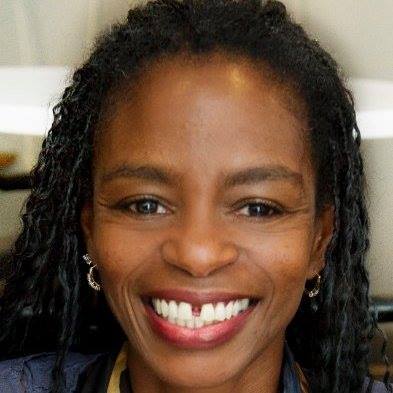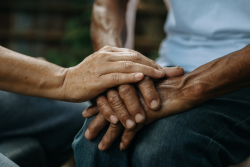by Adrianne Lind, American Women’s Club in Gothenburg and American International Club in Malmö
 Suddenly, things change
Suddenly, things change
I moved from the United States to Belgium in 2002, yet I always knew that I would come back to the US to help my family when they needed me. I couldn’t imagine it being any other way. At the time of my move, my parents were fit and robust and seemed to be in the prime of their lives. My older sister lived in town, and this knowledge gave me the wings and security I needed to move abroad.
Fast forward 15 or so years, and suddenly my robust parents were elderly. My sister was living at home again, and I started wondering what our future would hold. Then Daddy slowed down tremendously, and almost 70 years after meeting my mother at university, he became the sole focus of my mother’s life. Everything she did centered around him. And thus the future began shaping up for me. Big changes were needed in our family household. But what could I do from Europe? How could I step into a caregiver role?
Making decisions
According to the National Institute of Health’s National Institute on Aging (NIA), in the US, if you live an hour or more away from a person who needs care, you are a long-distance caregiver. So at least now I had an additional title. And I was to learn, as the NIA points out, that my duties can take many forms, from helping with money management and arranging for in-home care to providing respite care for a primary caregiver and planning for emergencies.
I’ll admit, I didn’t have a plan other than to love my parents with all my heart, as they loved me. I knew I could use the internet. I consider myself a fixer, so I set about to fix what I saw were either real or potential problems. For instance, I didn’t want all of the life to be sucked out of my mother as she poured all she had into my father. When it became difficult for him to walk and my mother would help him, I didn’t consider that sustainable. So I purchased a walker. Everyone thought that made sense.
Sharing responsibilities
My sister did everything on the ground. I took over managing the finances, and when I thought it was too tiring and stressful for my mother to support my father around the clock and maintain running the house, I decided she should no longer cook. I went about arranging meal delivery. Cooking was not my sister’s thing, though she’s gotten much better, so meal delivery sounded good to everyone. However, that wasn’t as simple as it sounds and took several months to make that happen.
At the time, my sister was still working full time and I eventually got my parents registered with Meals on Wheels (MOW). My mother enjoyed getting those meals delivered weekly. She would brightly open the door, hand over a check, receive the food, and then proceed to talk, laugh and socialize. It was a blessing. Furthermore, I learned from one of my mother’s Meals on Wheels ladies (as she dubbed them) that not every neighborhood in our city was serviced by a MOW center. In fact, my mother’s MOW lady had her own mother who would not be receiving MOW delivery. So there we were blessed again. I was grateful.
The NIA says experienced caregivers recommend that you learn as much as you can about your family members or friend's illnesses and medicines. Because she was in the house, my sister took over being in charge of our parents’ medications. I purchased two medication organizers that have 31 days and 4 time slots per day to organize our mother’s and father’s doses.
Communication is key
 The American Association of Retired Persons (AARP) advises long-distance caregivers to maintain steady communication and build a trusted team. Those two things are crucial, they emphasize. And I agree. The 5-times-a-week phone calls I placed became daily calls, and have even ramped up to twice or more a day. That’s challenging when I live six hours ahead of my family, and some days are exhausting to execute. But email was no longer an option, as my parents seemed to just stop using email overnight.
The American Association of Retired Persons (AARP) advises long-distance caregivers to maintain steady communication and build a trusted team. Those two things are crucial, they emphasize. And I agree. The 5-times-a-week phone calls I placed became daily calls, and have even ramped up to twice or more a day. That’s challenging when I live six hours ahead of my family, and some days are exhausting to execute. But email was no longer an option, as my parents seemed to just stop using email overnight.
And naturally the communication with my sister increased. Fortunately, we use text and email which facilitates a steady stream of information exchange.
Leaning on your tribe
Then the day came when it became clear that my father needed extra help out of the league that my mother and sister could provide. This was very scary and worrying for me. Who do you invite into your home to take care of your father’s physical body? Who is competent? Who do you trust?
We turned to our church, where my mother was an organist for over 50 years and my father had served in several capacities for an equal length of time. The church where my sister and I were baptized and confirmed, and where my sister became one of the youngest people chosen to serve in leadership.
Another source was a former colleague of my mother, and yet another was the mother of a friend I made in my European host country. The sister of one of my dearest friends was an invaluable resource, as she was navigating the same waters with her mother. We were able to build a trusted team of professional caregivers by asking those we trusted. Anything to keep my father at home. Everything.
Be legally sound
I made sure my parents had their paperwork in order, including giving my sister and me legal authority to make financial and healthcare decisions as well as manage doctor’s appointments and records. My father’s doctor helped navigate my father’s care, authorizing whatever he needed to stay at home, from nurse visits to physical therapy to completing the paperwork needed for my sister to obtain family leave.
Minimize tension
Ever since I became a teenager, I couldn't imagine being in conflict with my older sister. But her being second in line to my mother in caring for my father while I lived in Europe could be a reason for conflicts to arise. We declared that we would stick together and not let that happen. AARP has advice for siblings in similar situations, including coming up with a consensus, establishing an appropriate division of labor, and asking for what you need.
Ensure they get what they’ve earned
Nerdwallet recommends getting the most out of available benefits when caring for a loved one from afar. I was not disappointed with the Office on Aging where my parents lived. I tapped into every benefit for which my parents qualified and sighed when reading about ones for which they didn’t. But we took what we could and are grateful for it. Turning to my network, I was able to fill the gaps by getting recommendations, asking questions like “If your parents needed safety rails in the bathroom, who would you have install them?” My high school prom date recommended a company he used when his mother needed the same thing. So the modifications were made. Adjusting to the new way of living is a continuous process, and I’m always looking for the next solution.
Always look on the bright side of life
Caring.com encourages us long-distance caregivers to look on the bright side, going as far as to say that a benefit to being a long-distance caregiver is the satisfaction you’ll feel knowing that you’re providing important help to the seniors you care about so they can remain comfortably at home. I can’t say I feel any satisfaction. I’m opting to go the “no regrets” route. I don’t want to think I could have or should have done something and didn’t. I don’t want to feel as if I’ve let anyone down.
But in my experience that has not been possible. You’re wanted and needed with your parents and missed when you are not there – and I’d like to think, missed and needed when leaving the family you’ve created abroad. It’s akin to a no-win situation, as who can be in two places at the same time?
I’m also opting for compassionate self-forgiveness, comforted by the fact that I truly know I am doing the absolute best that I can.
Adrianne Lind is a member of the American Women’s Club in Gothenburg, and the American International Club in Malmö. She is a past President of the American Women’s Club in Stockholm, a past 2nd VP & Charity Chair of the International Women’s Club of Gothenburg, and a past FAWCO Representative for the American International Club in Malmö. She is a current member of the FAWCO Human Rights Team and served on other FAWCO committees over the years. Adrianne is a passionate overseas US voter advocate, community builder, blogger, podcaster, and yoga instructor. She tries to quilt and knit, and enjoys cooking, reading, traveling, and most of all spending time with her family and friends.
Photos by Adrianne Lind
